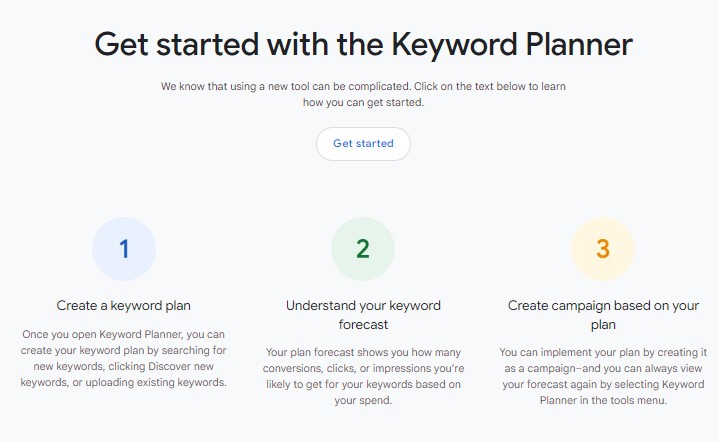
How to Leverage Google Ads Key Planner Effectively

Key Highlights
- Unlock Keyword Potential: Discover how to use Google Ads Keyword Planner to reveal powerful keywords and supercharge your online visibility.
- Free Access, Maximum Impact: Learn how to tap into the power of Google Ads Keyword Planner without spending a dime on ads.
- Master Keyword Research: Explore proven techniques to uncover the best keywords for your niche, understand search volume, and analyze competition.
- Optimize Your Google Ads Campaigns: Optimize your Google Ads campaigns for maximum ROI with strategic keyword implementation and effective ad group creation.
- Boost Your SEO Strategy: Gain insights into how Google Ads Keyword Planner can enhance your content marketing and website SEO.
Introduction
In the dynamic landscape of digital marketing, harnessing the power of keywords is paramount to amplifying your online presence. Enter Google Ads Keyword Planner - a robust, free tool that empowers businesses to unearth keyword treasures, understand search trends, and refine their marketing strategies for optimal reach and impact.
Understanding Google Ads Keyword Planner

Google Ads Keyword Planner is much more than a simple keyword research tool. It's your secret weapon for unlocking valuable insights into the search habits of your target audience. By understanding which keywords people use to find products or services like yours, you gain the power to tailor your content, optimize your website, and craft laser-focused Google Ads campaigns.
This, in turn, leads to higher visibility in search results, increased website traffic, and ultimately, more leads and conversions. Whether you're an experienced marketer or just starting, understanding the capabilities of Google Ads Keyword Planner can revolutionize your approach to digital marketing.
The Importance of Keywords in Digital Advertising
Keywords are the backbone of any successful Google Ads campaign. They act as the bridge connecting your offerings with the people actively searching for them online. By incorporating relevant keywords into your ad copy and website content, you signal to search engines what your business is about and who you want to reach.
This targeted approach ensures that your ads appear in front of the right audience at the right time. Instead of casting a wide net and hoping for the best, you'll be attracting high-quality traffic—individuals genuinely interested in what you have to offer.
The result? Improved ad relevance, higher click-through rates, and a greater chance of converting those clicks into loyal customers. That's the power of leveraging keywords effectively in your digital advertising strategy.
Overview of Google Ads Keyword Planner Features
Google Keyword Planner is packed with features that empower you to uncover valuable keyword ideas and craft data-driven strategies. Let's explore its key functionalities:
- Discover New Keywords: Input a list of seed keywords or your website URL, and Google Keyword Planner will generate a treasure trove of related keywords. You'll uncover new ideas, long-tail variations, and niche-specific terms to expand your reach.
- Analyze Search Volume & Competition: Each keyword suggestion comes with valuable metrics, including search volume (the average number of monthly searches) and competition level. This allows you to prioritize keywords with high search volume and manageable competition.
- Uncover Keyword Trends: Google Keyword Planner provides historical data and trend analysis, allowing you to identify seasonal fluctuations and capitalize on emerging keywords. Understanding these patterns empowers you to create timely campaigns and stay ahead of the curve.
Setting Up Google Ads Keyword Planner
Accessing Google Ads Keyword Planner is surprisingly straightforward. While a Google Ads account is required, you don't need to run active campaigns to utilize this powerful tool.
Simply create a Google Ads account (it's free!), navigate to the "Tools & Settings" menu, and select "Keyword Planner" under the "Planning" section. From there, you can jump right into exploring keywords and refining your marketing strategy.
Accessing Google Ads Keyword Planner for Free
A common misconception is that Google Ads Keyword Planner is solely for advertisers with active campaigns. Fortunately, that's not the case! You can unlock the power of Google Keyword Planner without spending a dime on ads.
Here's how:
- Create a Google Ads Account (if you don’t have one): This is free and straightforward; you only need a Google account.
- Skip Campaign Creation: You might see prompts to set up a campaign after signing up. You can safely skip these prompts to access the keyword planner tool directly.
- Navigate to Keyword Planner: Find the "Tools & Settings" icon at the top-right corner of your Google Ads dashboard. Click it, and under "Planning," you'll find "Keyword Planner."
Now you have full access to the keyword research features without launching a campaign!
Navigating the Interface of Google Ads Keyword Planner
Navigating the Google Ads Keyword Planner interface is simple and intuitive, even if you're new to Google Ads. Here's a quick guide to get you started.
Start by heading to the Google Ads website and logging in. Once you are in your account, look for the "Tools & Settings" icon in the top right corner of the screen. Clicking it will open up a menu with an option that says "Keyword Planner".
Upon clicking it, you'll be taken to the Keyword Planner interface, where you'll find a search bar to enter your initial keywords or website URL. There are two main sections of the keyword planner: "Discover new keywords" and "Get search volume and forecasts." For basic keyword research, "Discover new keywords" is the ideal starting point.
From there, you can explore keyword suggestions, analyze metrics, and refine your search using various filters. Google Ads Keyword Planner even offers a handy tutorial to guide you through its features.
Mastering Keyword Research with Google Ads Keyword Planner

Now that you know how to access Google Ads Keyword Planner, let's dive into the heart of effective keyword research. The goal is to unearth keywords that perfectly align with your target audience's search behavior and business objectives.
This involves understanding their needs, pain points, and how they search for solutions online. By stepping into the shoes of your ideal customer, you can anticipate their search queries and tailor your keyword strategy accordingly.
Identifying Your Target Audience and Their Search Habits
Before diving into keyword research, it's crucial to clearly define your target audience. Who are they? What are their interests, demographics, and pain points? Understanding their needs and motivations is key to uncovering the keywords they use when searching online.
Consider the language they use, the questions they ask, and the platforms they frequent. Tools like Google Analytics can provide insights into your existing audience, helping you identify patterns in their search habits.
Furthermore, staying informed about industry-specific keyword trends is essential. Are there any emerging terms or phrases gaining traction? Monitoring these shifts helps you adjust your strategy and remain relevant in the ever-evolving digital landscape.
Generating Keyword Ideas for Maximum Reach
Google Keyword Planner empowers you to generate a plethora of keyword suggestions based on your initial input. Begin by entering seed keywords related to your business, products, or services. You can also input a competitor's website URL to analyze their keyword strategy.
The tool will then generate a list of related keywords, along with valuable metrics such as search volume, competition level, and even suggested bid estimates if you're planning to run ads. Don't be afraid to experiment with different keywords and phrases to uncover hidden gems.
Remember, the key is to strike a balance between high search volume keywords and those with manageable competition. Targeting long-tail keywords (longer, more specific phrases) can also be highly effective in attracting qualified traffic. Keep refining your list and exploring new keyword ideas until you've compiled a comprehensive set that aligns with your overall marketing goals.
Analyzing Keywords for Campaign Success

Gathering a robust list of potential keywords is only the first step. The real magic happens when you start analyzing those keywords to determine their relevance, competition, and potential impact on your campaign goals.
This involves understanding keyword metrics, identifying the right match for your target audience, and selecting the most promising options to drive qualified traffic and maximize your return on investment.
Understanding Keyword Metrics and Their Impact
Understanding key metrics associated with each keyword is crucial for making informed decisions that impact your overall performance. Let's break down a few essential metrics:
- Average Monthly Searches: This metric, readily available in Google Ads Keyword Planner, reveals the estimated number of times a particular keyword is searched for on Google each month. It gives you an idea of the potential audience size for that keyword.
- Competition: Keyword competition indicates how many advertisers are bidding on a particular keyword. High competition typically means higher ad costs and greater difficulty ranking organically.
- Top of Page Bid: This metric shows the estimated cost-per-click (CPC) required to have your ad appear at the top of the page for a specific keyword. It can help you gauge the competitiveness and budget implications.
Selecting the Right Keywords for Your Campaigns
Choosing the right keywords involves finding the sweet spot between relevance, search volume, and competition. Start by prioritizing keywords that are highly relevant to your products or services and align with your target audience's search intent.
Next, consider search volume and competition. Aim for keywords with a healthy balance: enough search volume to attract potential customers but not overly competitive to make ranking difficult.
Utilize ad group ideas to organize your keywords into thematic groups, allowing you to create more targeted ad campaigns.
Here's a simple table to illustrate:
Keyword Category
Keyword Example
Search Volume
Competition
Digital Marketing Services
SEO agency
High
High
Content Marketing Strategies
Blog post ideas
Moderate
Medium
Social Media Management Tips
Instagram marketing strategy
Moderate
Low
Implementing Keywords into Your Campaigns
Now that you've selected a set of winning keywords, it's time to put them into action. This involves strategically incorporating them into your website content, ad copy, and meta tags to optimize your online presence.
Effective keyword implementation is an art and a science, requiring a nuanced understanding of keyword density, search intent, and the delicate balance between optimizing for search engines and creating valuable content for your audience.
Crafting Effective Ad Copy Using Selected Keywords
When crafting compelling ad copy, integrating your chosen keywords naturally and strategically is paramount. Begin by grouping relevant ad groups based on keyword themes. This enables you to create highly focused ads that resonate with specific audience segments.
Incorporate your keywords into the ad headline and body copy, ensuring they flow seamlessly within the text. Avoid keyword stuffing, as it negatively impacts readability and can harm your ad's quality score. Instead, prioritize clarity and relevance for your target audience.
Finally, ensure your ad's landing page aligns with the keywords and message conveyed in your ad copy. This consistency improves the user experience and increases the likelihood of conversions.
Adjusting Bids Based on Keyword Performance
Monitoring and adjusting bids based on keyword performance is crucial for optimizing your Google Ads campaigns and maximizing your return on investment. Regularly review your keyword data within the performance max section to identify top performers and areas for improvement.
For keywords driving significant traffic and conversions, consider increasing your bids strategically to secure higher ad positions and gain greater visibility. On the other hand, for keywords underperforming, analyze the data to understand why.
Is the search intent misaligned with your offerings, or is the competition too high? Based on your analysis, you can either adjust bids, pause underperforming keywords, or refine your targeting to improve overall campaign effectiveness.
KeywordSearch: SuperCharge Your Ad Audiences with AI
KeywordSearch has an AI Audience builder that helps you create the best ad audiences for YouTube & Google ads in seconds. In a just a few clicks, our AI algorithm analyzes your business, audience data, uncovers hidden patterns, and identifies the most relevant and high-performing audiences for your Google & YouTube Ad campaigns.
You can also use KeywordSearch to Discover the Best Keywords to rank your YouTube Videos, Websites with SEO & Even Discover Keywords for Google & YouTube Ads.
If you’re looking to SuperCharge Your Ad Audiences with AI - Sign up for KeywordSearch.com for a 5 Day Free Trial Today!
Conclusion
In conclusion, mastering Google Ads Keyword Planner is essential for a successful digital advertising strategy. Understanding the importance of keywords, navigating the features, and analyzing metrics are key steps. By identifying your target audience and selecting the right keywords, you can craft effective ad copy and optimize bid strategies for campaign success. Regularly reviewing and adjusting your keyword strategy is crucial for ongoing performance. Stay ahead in the digital advertising game by leveraging the power of Google Ads Keyword Planner effectively. If you want to boost your campaigns, start by accessing this free tool and optimizing your keyword research process.
Frequently Asked Questions
How do I find the best keywords for my niche?
Finding the best keywords for your niche involves a blend of understanding your target audience, conducting competitive research, and utilizing keyword research tools like Google Ads Keyword Planner. A skilled digital marketer will focus on keywords with a good balance of search volume, relevance, and competition, incorporating them naturally into their content creation and marketing efforts.
Can Google Ads Keyword Planner help with SEO?
Absolutely! While primarily designed for advertisers, Google Keyword Planner offers valuable insights that significantly benefit SEO. By understanding search volume and competition for keywords related to your website, you can refine your SEO strategy, improve search engine rankings, and elevate your online presence.
What are the benefits of using long-tail keywords in Google Ads?
Long-tail keywords – those longer, more specific phrases – are a goldmine for Google Ads advertisers. While they may have lower individual search volume, their specificity often translates to low competition level and higher conversion rates, as they attract a highly targeted audience actively seeking those precise products or services.
How often should I review and adjust my keyword strategy?
Regularly review keyword strategy to ensure it aligns with your Google Ads campaign goals and evolving keyword trends. A good practice is to review and adjust your strategy quarterly, or more frequently if your business is subject to seasonal keywords or operates in a rapidly changing market. Analyzing your overall performance data will help guide these adjustments.
